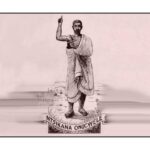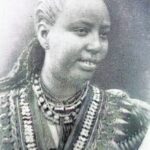HUTTON MILLS, THOMAS
- 5 Min Read
Thomas Hutton-Mills (June 1865-March 14, 1931), the first president of the National Congress of British West Africa, was a noted politician, statesman, educationist, and lawyer, who was active in the final years of the 19th century and the earlier years of the 20th century.

PHOTO CAPTION: Thomas Hutton-Mills SOURCE: EA Library
He was born in 1865, and named Korle Na. His father was John Edward Hutton-Mills, and his mother was Emma Bannerman, daughter of James Bannerman, lieutenant-governor of the Gold Coast settlement in 1850-51. He was educated at the Duker School, Accra, and at the Wesleyan School in Freetown, Sierra Leone.
Upon his return to the Gold Coast in 1881, he became a teacher at the Johnson School, Accra but later resigned and entered the customs branch of the Gold Coast civil service. He transferred to the Law Officers’ Department because he wanted to study law, and worked under the Queen’s advocate, thus gaining an insight into the intricacies of the legal system. After a year’s service, he was dismissed in October 1885 for participating in the Accra riots. He then became chief clerk in the law offices of his uncle, Edmund Bannerman. In 1891 he was sent to England to study law at the Inner Temple, and was called to the Bar in 1894.
Upon his voyage home, he stopped in the Gambia, where he was enrolled as a practitioner. He soon changed his mind about practising in the Gambia, however and returned to Accra to be enrolled at the Supreme Court. He also visited Calabar in what is now Eastern Nigeria, where he practised as a lawyer before finally deciding to settle in Accra. His house in Accra became the meeting place of politicians. He came to wield great influence, and established an extensive legal practice.
He began his legal career as public prosecutor, before going into private practice. As a lawyer, he studied his cases carefully, and was courteous to both clients and opponents. These years represented the periods of nationalism in which the Aborigines’ Rights Protection Society (A.R.P.S.), formed at Cape Coast in 1897, successfully lobbied against such measures as the Lands Bill of 1897, which, if enacted, would have jeopardised the African land tenure system.
Hutton-Mills was one of the counsel for the petitioners against the Lands Bill when it was introduced in the Legislative Council in 1898. In the same year he was appointed an unofficial member of the Legislative Council, and became a member of the Accra Town Council in 1899. In 1900 he took part in the Legislative Council debates on the Concessions Ordinance of 1900 (which gave the British courts supervision over the validity of concessions, but left no doubt that the land belonged to the Africans).
In that same year, however, he had to resign his membership in the Legislative Council when he was charged with professional misconduct. He was tried and acquitted because it was discovered that one of his clients had given false evidence against him. He was reappointed to the Legislative Council in 1909, and remained a member until 1918. He strove for recognition of the A.R.P.S. as the organisation which spoke for the people in the Legislative Council. He was an acute critic of the government, and a persuasive debater, participating in the fight against the Forest Lands Bill of 1911, which was subsequently withdrawn.
In 1917 Hutton-Mills joined J. E. Casely Hayford, and others, in working to convene a National Congress of British West Africa to discuss problems common to the Gambia, Sierra Leone, the Gold Coast, and Nigeria. They brought Nana Ofori Atta I, Omanhene (paramount chief) of Akyem Abuakwa from 1912-43, into their discussions. Later, Ofori Atta opposed the congress in the Legislative Council.
Hutton-Mills was the first president of the congress, and was a member of the congress delegation that travelled to London in 1920. Though Lord Milner, Colonial Secretary from 1918-21 refused to grant them an audience, they were given an audience by the League of Nations Union, under the chairmanship of the renowned Classical scholar Professor Gilbert Murray (1866-1957). Hutton-Mills took an active part in the discussions.
When he left the Legislative Council in 1918, His Majesty King George V, on the recommendation of Sir Hugh Clifford, governor of the Gold Coast from 1912-19, decreed that Hutton-Mills should retain the title of ‘Honourable’ for life, in recognition of his services to his country.
He was one of those who, from 1918 onwards pressed for the establishment of a government secondary school in the Gold Coast, and when he and other members of the A.R.P.S. launched a National Education Scheme to promote secondary education, Hutton-Mills became one of the trustees. Eventually Achimota College, near Accra, was opened in 1927, partly as a result of this agitation.
As president of the National Congress of British West Africa, he proposed popular elections to the Legislative Council, and opposed the proposals put forward for native administration by Sir Gordon Guggisberg, governor from 1919-27, which strengthened the authority of the paramount chiefs.
He was a member of the Board of Education, and made many useful suggestions in this capacity which were accepted by the government. He was also a devout churchman, who became chancellor of the diocese of the Anglican Church of the Gold Coast, and gave several gifts to the Holy Trinity Church in Accra, including a pipe organ. A patron of many of the literary and social clubs of the period, he was a founding member of the Rodger Club (an African club, named after Governor Rodger, in office from 1904-10), which elected him as chairman.
A keen sportsman, he played cricket for the Gold Coast against Nigeria in 1905, and was a tennis enthusiast. He died in 1931.
L. H. OFOSU-APPIAH





